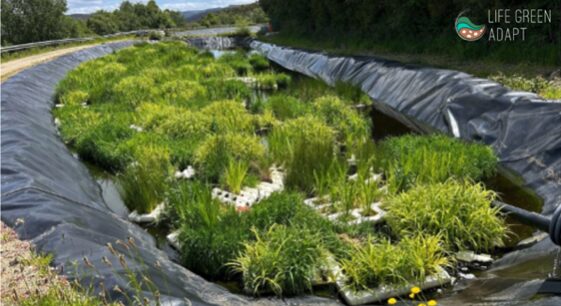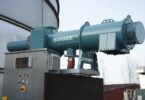LIFE GREEN ADAPT is an EU-funded project funded under the LIFE programme (GA no. LIFE20 CCA/ES/00179) that aims to increase the resilience of EU waste infrastructures against climate change. This will be achieved by demonstrating the potential of blue-green infrastructure (BGI) and ecosystem-based approaches to manage flash flooding and runoff caused by heavy rainfall, preventing fires and explosions caused by droughts and unusual heat waves.
The LIFE GREEN ADAPT project started in June 2021 with some ambitious objectives, including:
- To demonstrate an innovative and widely replicable approach based on the use of BGI’s.
- To reduce the risk of landfill landslides associated with floods and extreme rainfall events, often caused by climate change.
- To efficiently manage new green areas by reducing water consumption and storm water runoff.
To achieve these objectives the LIFE GREEN ADAPT consortium proposes an enhanced wider use of BGI’s as climate adaptation solutions.
These solutions are:
- The use of bio-technosoils for soil stabilisation caused by extreme rain and floods
- The combination of innovative treatment wetlands to store and treat leachates and the temporarily high contaminated runoff water.
- The reuse of treated wastewater to mitigate and cope with the effects of high temperatures, a result of fires and explosions. This will contribute to the guarantee of water availability.
Since the start of the LIFE GREEN ADAPT, the project consortium has made considerable progress when achieving their project objectives. For instance, novel bio-technosoils have been developed and they are currently covering the landfill demonstration site at project partner, Xiloga’s landfill. The developed bio-technosoils cover the landfill to recover them by increasing their soil quality and boosting their nutrient supply. This will ensure the vegetation is able to grow on the landfill.
Additionally, treatment wetlands have been constructed for landfill polluted leachate and runoff water treatment. These treatment wetlands play a significant role within the project as they improve the water quality of stormwater runoff and manage watershed nutrients as well as the treatment of wastewater and other industrial contaminants. These treatment wetlands will also reduce the effects of high temperatures and help prevent droughts so treated water can be discharged into natural waters, reducing the effects of droughts on water scarce areas.
Finally, the LIFE GREEN ADAPT have added specifically selected plants to the treatment wetlands with the aim of absorbing the chemicals found within the water. This activity included aspects of plant testing within these treatment wetlands to ensure the plants with the highest chemical absorption rate were chosen to be used. During this analysis the consortium found that some plants did not grow at the expected rate and eventually died, however, after increased plant testing the plants grew at a rapid rate whilst absorbing chemicals found in the water, this water is now at sufficient levels to be used, enabling not only water reuse but also a controlled discharge into natural waters which will eventually reduce the drought effects in water scarce regions.
As well as developing the LIFE GREEN ADAPT concept within our demonstration site, the project consortium often presents the project success and results at industry relevant events and conferences. Most recently the LIFE GREEN ADAPT project was presented by CINEA at the IFAT Worldwide, the world’s leading fair for environmental technologies. The LIFE GREEN ADAPT project was positioned at the CINEA stand along with other LIFE Programme funded projects. Furthermore, a specialist presentation of the LIFE GREEN ADAPT was carried out by the CINEA team at a LIFE programme session titled “Discover opportunities from the EU’s funding instrument for environmental and climate change.” The LIFE GREEN ADAPT project is committed to disseminating and communicating the results of the project to industry leaders to increase the overall impact of the project’s solution, and IFAT Worldwide presented a great opportunity to achieve this.
To hear more about the LIFE GREEN ADAPT project, visit our website, and follow us on LinkedIn and X.
Related articles:
How do municipal wastes contribute to water pollution?







